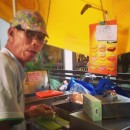It was a good year to be abroad! Past Review
By A M (Plan Ii Honors, The University of Texas at Austin) - abroad from 08/01/2013 to 05/01/2014 with
National University of Singapore: Singapore - Direct Enrollment & Exchange
I gained a broader sense of what my place is in the world. I feel more open-minded, daring, and outgoing than I was before. It was even more worthwhile to study in Singapore because I chose to do so for an entire academic year. It felt less touristy, and more real. Now that I'm back, I can surely say that my year abroad has altered my perspective for the better.
Review Photos





Personal Information
| How much international exposure did you have prior to this program? | 1 month - 6 months |
Review Your Program
|
* Overall educational experience
Academic rigor, intensity, resources, etc. |
Singaporeans are pretty competitive, and NUS was no exception. I was enrolled in FASS, where I found that most local professors had a paternalistic attitude toward students. However, in smaller classes, this was not the case, as those professors were thrilled that students decided to enroll in a "topic course". The foreign professors were definitely more understanding and relaxed compared to their Singaporean counterparts. Either way, NUS was a good gateway to see how the rest of Asia learns in comparison to America. In terms of educational resources, I felt that my home university had more to offer. With a semi-crowded campus, it can be difficult to find places to study at NUS. I'd recommend the Medical Library (open 24/7!) -- it was definitely one of my favorite places to grab a coffee and hit the books! Watch out for the NUS campus buses when you're walking! And be prepared to wait a while for the buses to come during peak times -- the bus stop computer never really tells the right time ;) But it's a good thing, you can chat with the locals you're waiting with! Other than that, academic life at NUS is pretty manageable as long as you stay on top of things and do your BEST to make friends with the locals. It may appear difficult, but if you keep trying, you'll surely have some local friendships by the end of your time there! |
|
* Host Country Program Administration
On-site administration of your program |
The NUS Housing system is pretty rigid -- rules are rules, and they don't bend them for anyone, really. Just abide by them (however ridiculous they may be), and you'll be fine! Singapore is one of the top safest places in the world, which means that such things always comes with price! The NUS International Students office, on the other hand, had super sweet staff who were willing to help with just about anything! Find their PALs FB page and get involved! Outdoor activities are planned for incoming exchange students every semester -- so get out there! I still keep in touch with a few of the student workers there. |
|
* Housing:
How satisfied were you with your living arrangements? |
I really would recommend the residential colleges in UTown or Residential College 4 (RC4/Khaya College). I lived in UTown Graduate Residence my first semester and found it pretty impersonal. As its name suggests, there aren't many activities to get you situated into local life, which is why the residential colleges kind of force you to get out there and discover. Also, the residential colleges come with meal plans, and that makes life so much easier! Some of the rooms even have A/C - wow!!! |
| * Food: |
Everything is pretty expensive in Singapore, but food is certainly available at discounted student prices in NUS canteens! So don't miss out! Because I'm vegetarian, I found it a little hard to try diverse food in Singapore. On campus, my faves were the Indian vegetarian stalls at PGP (Gopal's) and the same at UTown (Koufu). If you're looking for pizzas, try Sarpino's at YIH. A good coffee place I liked was Spinelli's in University Hall. If you want to grab a bite of falafel sandwich, try Cafe La Caire in the Computing/Business canteen, near FASS. |
|
* Social & Cultural Integration:
How integrated did you feel with the local culture? |
The local culture is pretty diverse, much like America, although the majority are ethnically Chinese. I would say during festivals like Chinese New Year, Deepavali (Indian), and Navratri (Indian) it was good to have local friends who'd invite you into their homes or around with their friends. So it really depends on how integrated you want to be. And don't be shy if you want to know more about a culture -- the first step is to make friends. Other than ethnic culture, I feel like Singapore society matches other developed, first-world nations. There are plenty of 8 story malls and eating places -- both which seem like national pastimes! |
|
* Health Care:
How well were health issues addressed during the program? |
UT Austin had a great international service system where you could call 24/7 with any questions. I once got sick on a trip back from Thailand, and I was able to get guidance from a Western doctor on the phone. I followed their advice to see the University Health Center. The UHC helped with my issue, but the doctor was pretty paternalistic and wasn't really listening to my side of the issue. Also, the wait times can be long. Also be aware that drug prices may be higher for exchange students than locals. |
| * Safety: |
Singapore is a very safe country, as I kept hearing from my local friends and witnessing myself, too. Because the country's laws are pretty stringent for those who intend to break them, its citizens have developed a certain culture that makes them want to protect their homeland. That means, they will try their hardest to remain lawful citizens of the state. As a feature of curbing crime, etc., Singapore trains/buses stop around 12 midnight -- it's like a mandatory curfew for people. But you can definitely still travel the island country by taxi or car. |
| If you could do it all over again would you choose the same program? |
Yes
|
Finances
|
* Money: How easily were you able to live on a student's budget?
(1 = not very easy/$200+ on food & personal expenses/week, 2.5 = $100/week, 5 = very easily/minimal cost) |
It was pretty easy to live on a student budget. Because I stayed in a residential college the 2nd semester at NUS, I greatly saved cash. The first semester was a bit difficult because UTown Graduate Residence didn't have a meal plan. |
| Not including program expenses, about how much money did you spend on food and other expenses each week? | SGD$150 |
| Do you have any general money-saving tips for future study abroad participants? | Don't splurge on shopping even though there are tons of opportunities to. Find the cool cultural stuff in Little India and Chinatown, etc -- that's worth your money more than the Western brands. Also, save up at least SGD$350 for each place you travel, not including flights. For international flights, try Tiger or AirAsia. For more quality flights, use Singapore Airlines! |
Language
| * Did your program have a foreign language component? | No |
Other Program Information
|
* Where did you live?
Select all that apply |
|
|
* Who did you live with?
Select all that apply |
|
|
* Who did you take classes with?
Select all that apply |
|
| About how many local friends did you make that you will likely keep in touch with? |
A Look Back
| * What did you like most about the program? |
|
| * What could be improved? |
|
| * What do you know now that you wish you knew before going on this program? | I wish I would have believed more that everything would fall into place. Before leaving, I think I wanted to plan out a lot of itsy bitsy stuff, like where to get what, what to do, etc. But I'm glad that I let all of that go within the first week of arriving there. The unknown is pretty nice :) |
Reasons For Studying Abroad
| To help future students find programs attended by like-minded individuals, please choose the profile that most closely represents you. |
The Academic or LinguistYou went abroad with specific academic goals in mind; the program credentials and rigor of your coursework abroad were very important to you. You had a great time abroad, but never lost sight of your studies and (if applicable) were diligent with your foreign language study. Good for you! |








